Preserving Dignity in Critical Moments: Understanding Mobile Mortuary Freezers
When tragedy strikes or facilities reach capacity, the need for dignified care of the deceased doesn't diminish. That's where a mobile mortuary freezer comes in - a specialized portable refrigeration unit that preserves human remains with respect and care during challenging circumstances.
These essential units maintain temperatures between 0°C and 5°C, creating the perfect environment for temporary storage during emergencies, disasters, or when a facility undergoes renovations. Unlike their fixed counterparts, mobile mortuary freezers can be quickly deployed wherever they're needed most - whether that's a hospital experiencing overflow during a pandemic or a disaster zone following a natural catastrophe.
| Mobile Mortuary Freezer Essentials |
|---|
| Temperature Range: 0°C to 5°C (32°F to 41°F) |
| Typical Capacity: 1-6 bodies per unit (up to 24 in expandable systems) |
| Weight Range: 100-650 kg depending on model |
| Power Requirements: 115V/230V (some compatible with generators) |
| Preservation Time: 6 hours to several weeks |
The beauty of these units lies in their versatility without compromising quality. Modern mobile mortuary freezers feature robust construction with high-density polyurethane insulation (typically 10.2 cm/4" thick), reliable digital temperature monitoring systems, and durable stainless steel interiors that withstand rigorous cleaning protocols.
"The Flexmort AirCool is a mobile storage system that acts as a pop-up mortuary and is highly portable," notes one manufacturer, highlighting the rapid deployment capabilities that make these units invaluable when traditional infrastructure isn't available.
Here at American Mortuary Coolers, we've spent years designing and implementing mobile mortuary freezer solutions for funeral homes, hospitals, and disaster response teams nationwide. Our expertise in refrigeration systems ensures we understand both the technical specifications and practical applications of these essential units.
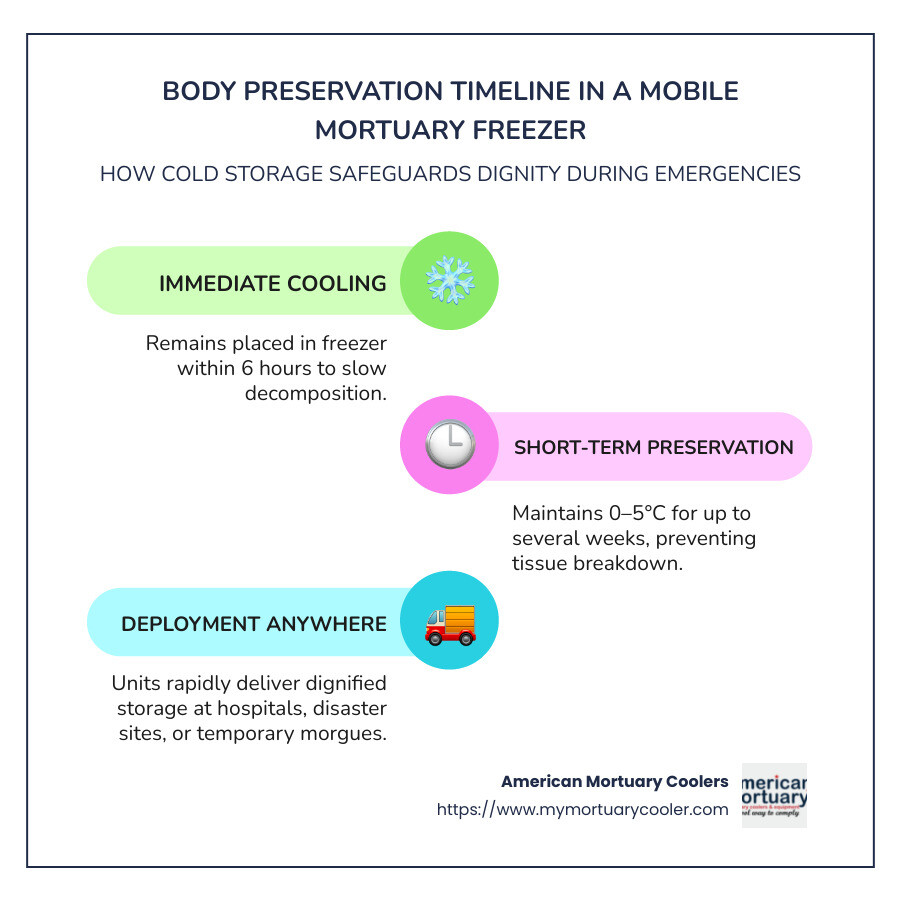
When discussing mobile mortuary freezers, you might also hear terms like morgue drawers, mortuary refrigeration systems, or mortuary equipment suppliers. These all relate to the broader ecosystem of dignified care for the deceased.
In challenging times, maintaining the cold chain for proper preservation isn't just about logistics – it's about honoring lives and supporting grieving families. A mobile mortuary freezer stands ready to fulfill this crucial role, ensuring dignity is preserved even in the most difficult circumstances.
Mobile Mortuary Freezers 101: Definition, Benefits & How They Differ From Traditional Units
When you compare mobile mortuary freezers with traditional fixed morgues, the differences jump right out at you. Traditional morgues are permanent fixtures built into hospitals, medical examiner offices, and funeral homes. They need dedicated space, extensive construction work, and permanent connections to utilities. Mobile mortuary freezers, on the other hand, offer flexibility and can be quickly set up almost anywhere power is available.
| Feature | Mobile Mortuary Freezer | Fixed Morgue Installation |
|---|---|---|
| Installation | Temporary, no construction needed | Permanent, requires building modifications |
| Deployment Time | Hours (some ready in 30 minutes) | Weeks to months |
| Capacity | 1-24 bodies (depends on model) | Often larger, but fixed capacity |
| Mobility | Highly portable, trailer or wheeled options | Stationary |
| Power Options | Standard outlets, generators, some solar | Hardwired electrical systems |
| Cost | $5,000-$60,000 depending on size | $100,000+ for construction and equipment |
| Scalability | Can add more units as needed | Limited by available space |
| Maintenance | Simpler systems, often fixable on-site | Complex systems requiring specialists |
At American Mortuary Coolers, we've seen these differences make a real impact for our clients across Tennessee, Georgia, Illinois, and beyond. During the height of COVID-19, we delivered mobile mortuary freezers to hospitals in New York and Los Angeles within days, giving them crucial extra capacity when their permanent facilities couldn't keep up.
What is a mobile mortuary freezer?
A mobile mortuary freezer is a portable cooling unit specifically designed to preserve human remains with dignity. These specialized units maintain temperatures between 0°C and 5°C (32°F and 41°F), which is perfect for preserving the deceased for short to medium periods.
Your typical mobile mortuary freezer includes a tough stainless steel or fiberglass exterior that can handle rough conditions. Inside, you'll find thick 4-inch polyurethane insulation that keeps the temperature steady. The cooling system uses reliable compressors similar to what you'd find in commercial refrigeration, but designed for this sensitive purpose. Most units come with digital controls that let you monitor the temperature precisely and sound an alarm if anything goes wrong.
What makes these units special is how they balance practical needs with respect for the deceased. As Lyn Anderson from Watford General Hospital said about the Flexmort AirCool system: "We chose Flexmort's AirCool because it's easy to put together, has large A4 pockets for identification documents, and fully rollered racking."
These units come in many sizes – from compact single-body models weighing under 100 kg to larger systems that can hold up to 24 individuals. Their portability makes them invaluable when traditional morgue facilities aren't available or can't handle the current need.
Key benefits during mass fatality events
When disaster strikes – whether it's a hurricane, pandemic, or major accident – mobile mortuary freezers become essential. Here's why they're so valuable in these difficult situations:
During the COVID-19 pandemic, we at American Mortuary Coolers delivered and set up units in Chicago and Dallas within 48 hours of receiving emergency calls. This rapid surge capacity helps communities respond when local morgues become overwhelmed.
Perhaps most importantly, these units help preserve dignity for the deceased. Proper refrigeration ensures remains can be maintained respectfully until identification is complete or funeral arrangements can be made. This gives families the time they need during incredibly difficult circumstances.
The flexible deployment of these units means they can go exactly where they're needed – hospitals, temporary morgues, disaster sites, or anywhere accessible by road. Systems like the Flexmort AirCool come in various sizes (4, 8, 12, 16, and 24 body capacities), letting emergency teams scale their response to match the situation.
Even in challenging weather, advanced models like the Flexmort AirCool Extreme maintain a steady 5°C inside when it's 40°C outside, ensuring remains are properly preserved no matter the conditions.
As one emergency management director told us after a tornado response: "The mobile mortuary freezers from American Mortuary Coolers allowed us to maintain dignity for the deceased while giving families the time they needed. Their quick setup made a difficult situation slightly more manageable."
In these critical moments, having the right equipment isn't just about logistics – it's about handling a sensitive situation with the care and respect every person deserves.
Types, Models & Capacities on the Market
The market for mobile mortuary freezers offers diverse solutions to meet varying needs across different scenarios. From compact single-body units to expansive trailer-based systems, the options available today reflect technological advancements in portable refrigeration and an increased focus on emergency preparedness.
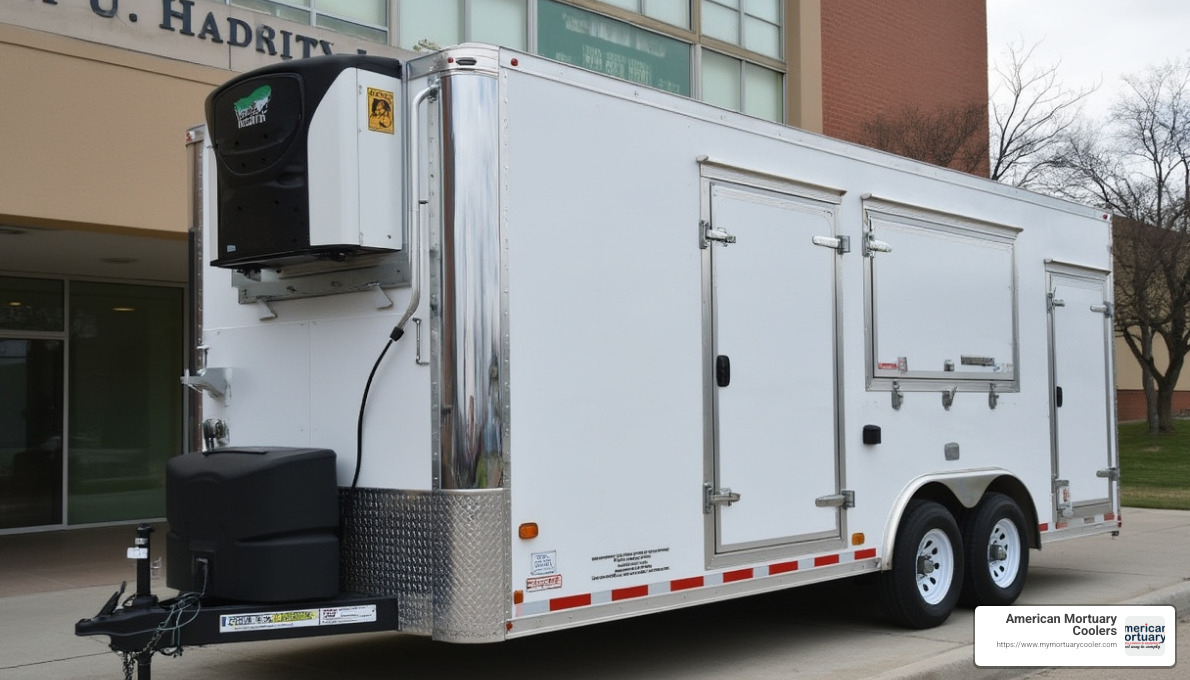
Popular mobile mortuary freezer models
The world of portable mortuary refrigeration has seen some remarkable innovations in recent years. Here at American Mortuary Coolers, we've watched these developments closely to ensure we're always offering the best solutions to our clients.
The Mortech MERC System® has truly changed the game as the first direct contact cooling system using liquid cooling technology for human remains. Unlike traditional air-cooling methods, this system provides more efficient temperature control through direct contact. What makes it especially valuable for emergency response teams is that it's completely portable, scalable, and can work seamlessly with other systems in the field.
Many of our hospital clients have fallen in love with the Flexmort AirCool pop-up system. I remember one hospital administrator telling me, "We opted for Flexmort's AirCool system because it's incredibly easy to assemble, has those handy large A4 pockets for body identification documents, and comes with fully rollered racking." This system can maintain a steady 5°C even when outside temperatures soar to 40°C, and it comes in configurations ranging from 4 to 24 bodies.
For situations requiring extreme portability, the MG M1 Dead Body Mobile Freezer from Murickens Group weighs less than 100 kg. Its lightweight design means a small team can move it with minimal equipment. It runs on standard 220-230V power and can even operate on generators as small as 2000VA – perfect for remote locations or disaster areas where power infrastructure might be compromised.
The Mobi-Fridge Trailer units have been particularly popular with our clients in coastal regions who need to prepare for hurricane season. These trailer-based units combine substantial capacity with the ability to quickly relocate as needed, without requiring separate transport vehicles for the freezer itself.
For forensic applications, the LEEC Mobile Forensic Mortuary Facility stands out. These specialized units come as close as possible to replicating fixed forensic mortuary facilities in a portable format. They feature impressive 115 mm insulated panels with a 30-minute fire rating and can be deployed by both land and air transport methods.
Our experience serving clients across the country has shown regional preferences in mobile mortuary freezer selection. Our Northeast and Pacific Region clients typically gravitate toward trailer-based solutions for their mobility, while Southeast Region clients prefer modular systems that can be easily expanded during severe weather seasons.
More info about portable morgue options
Dimensions, weight & storage capacity ranges
When helping clients select the right mobile mortuary freezer, we always start by discussing their specific needs around size, weight, and capacity. These specifications vary dramatically depending on intended use.
The smallest units we offer, like the single-body portable MG M1 and Classic-1 models, weigh under 100 kg. This means just one or two people can manage them without special equipment. These compact units are perfect for smaller facilities or as backup units. In contrast, multi-body fixed chambers typically weigh between 200-650 kg, which means you'll need forklifts or other mechanical assistance to move them.
Body capacity is another crucial consideration. Most standard mobile units hold between 1-6 bodies per freezer. For larger operations or emergency response, modular systems like the Flexmort AirCool offer capacities in multiples of 4, ranging from 4 to 24 bodies in a single deployment. This scalability has proven invaluable during surge events.
Space constraints often determine which model works best. A typical two-body unit (like our CR-2S model) measures approximately 2480×810×1190 mm, while single-body units average around 228.6 cm long, 71.12 cm wide, and 66.04 cm high. We always recommend measuring your available space carefully before making a selection.
For facilities serving diverse populations, we strongly recommend considering bariatric options. Models like the Flexmort AirCool Bariatric can accommodate individuals weighing up to 256 kg (40 stone), with specialized units designed to hold up to two bariatric individuals. This capability ensures dignity for all individuals regardless of size.
Modern mobile mortuary freezers have come a long way in terms of usability. Many now feature adjustable racking systems compatible with standard mortuary trolleys, making body transfer and storage organization much more manageable for staff.
I've noticed that dimensional considerations become particularly important when planning for transportation logistics. Our clients in the Midwest and Rocky Mountain regions, who often need to cover large geographic areas, appreciate that compact models like the MG M1 can be transported in standard vans or pickup trucks. For communities preparing for potential mass casualty events, the larger multi-body systems may require dedicated transport vehicles, but their capacity makes them worth the additional planning.
Core Features & Technical Specifications You Must Know
Let's talk about what makes these units tick! Understanding the technical side of mobile mortuary freezers helps you make smart choices for your specific needs. These aren't just fancy coolers - they're sophisticated systems designed to perform flawlessly even in challenging conditions.
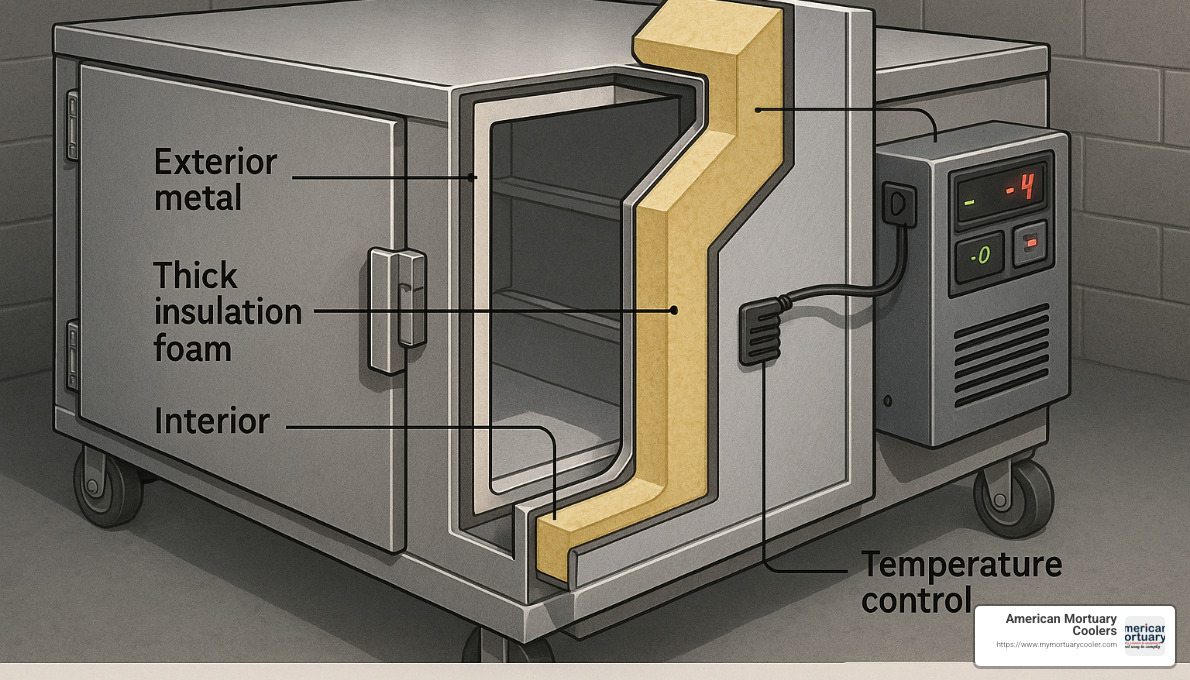
Temperature control & monitoring in a mobile mortuary freezer
The heart and soul of any mobile mortuary freezer is its ability to maintain precise temperatures. Modern units have come a long way from the old dial thermostats of yesteryear.
Today's digital controllers allow you to set temperatures exactly where you need them - typically between 0°C and 5°C (32°F to 41°F). Many of our Mortech models at American Mortuary Coolers operate specifically at 3°C (38°F), which we've found to be the sweet spot for preservation.
But it's not just about setting temperatures - it's about maintaining them. That's why advanced models include continuous data logging that creates a permanent record of temperature stability. This isn't just for peace of mind; it's often required for regulatory compliance.
"The digital monitoring system on our American Mortuary Coolers unit gives us peace of mind," shared a funeral director from Columbia, SC. "We can check temperatures remotely, even after hours, and the alarm system has alerted us to potential issues before they became problems."
Speaking of alarms, quality mobile mortuary freezers include battery backups that keep alarm systems functioning for up to 72 hours during power outages. These systems alert you to temperature changes, power problems, or even doors left ajar - critical warnings that can prevent catastrophic failures.
For those who need even more assurance, many units now offer remote monitoring via smartphone apps. Imagine being able to check your unit's status while at dinner or even on vacation! And for ultimate reliability, premium models include redundant temperature sensors that provide backup in case one fails.
Power supply & energy efficiency options
A challenge with mobile mortuary freezers is ensuring they have reliable power wherever they're needed. Thankfully, modern units offer flexibility that would have seemed like science fiction just a decade ago.
Most units operate on standard electrical systems - either 115V (typical in North America) or 220-230V (international standard). But what makes today's units special is their adaptability. Many mobile mortuary freezers, like the compact MG M1, can run on portable generators as small as 2000VA - perfect for disaster zones or rural areas.
Some innovative manufacturers have even started integrating solar power capabilities. We've worked with clients in remote areas of our Southwest Region to develop hybrid power solutions that combine generator backup with solar supplements. These systems ensure reliable operation even when the power grid is questionable at best.
Energy efficiency has also become a major focus. Today's units feature CFC-free polyurethane insulation, energy-efficient compressors (typically 1/2 hp), and LED lighting that dramatically reduces power consumption. Some multi-body units even allow you to power down unused sections - why cool empty space?
What about power fluctuations? Units like those from Himalaya Refrigeration operate within a wide 187–242V range, accommodating the voltage swings common in field deployments without missing a beat.
Scientific research on polyurethane insulation
Safety & hygiene features
When you're dealing with human remains, hygiene isn't just important - it's essential. Modern mobile mortuary freezers are designed with this reality firmly in mind.
High-quality door seals and gaskets create airtight environments that not only maintain temperature but also prevent cross-contamination. Inside, stainless steel surfaces with antimicrobial properties inhibit bacterial growth and make thorough cleaning much easier.
"The antimicrobial surfaces and easy-clean design of our American Mortuary Coolers unit have significantly improved our infection control protocols," noted a medical examiner from our Pittsburgh service area. "The password protection also ensures that temperature settings can't be accidentally changed."
The floors deserve special mention too - non-slip resin flooring with coved corners eliminates those tiny crevices where contaminants love to hide. Some units even include dedicated storage areas for personal protective equipment, ensuring safety gear is always within reach when you need it.
For environments with heightened concerns about airborne pathogens, advanced units may incorporate HEPA filtration systems. And emerging technologies include built-in UV-C light systems that provide additional surface disinfection during periods when the unit is empty.
Safety features extend beyond hygiene too. Password-protected controls prevent unauthorized temperature adjustments, while internal emergency door releases ensure no one can ever become accidentally trapped inside a unit.
At American Mortuary Coolers, we believe these seemingly small details make a world of difference in daily operation - and they reflect our commitment to both the living and the deceased.
Deployment, Safety & Surge Best Practices
Getting a mobile mortuary freezer where it needs to be—quickly and safely—can make all the difference during emergencies. Whether you're using transport trailers, forklifts, or simply rolling units into place, proper deployment ensures these vital systems perform when needed most.
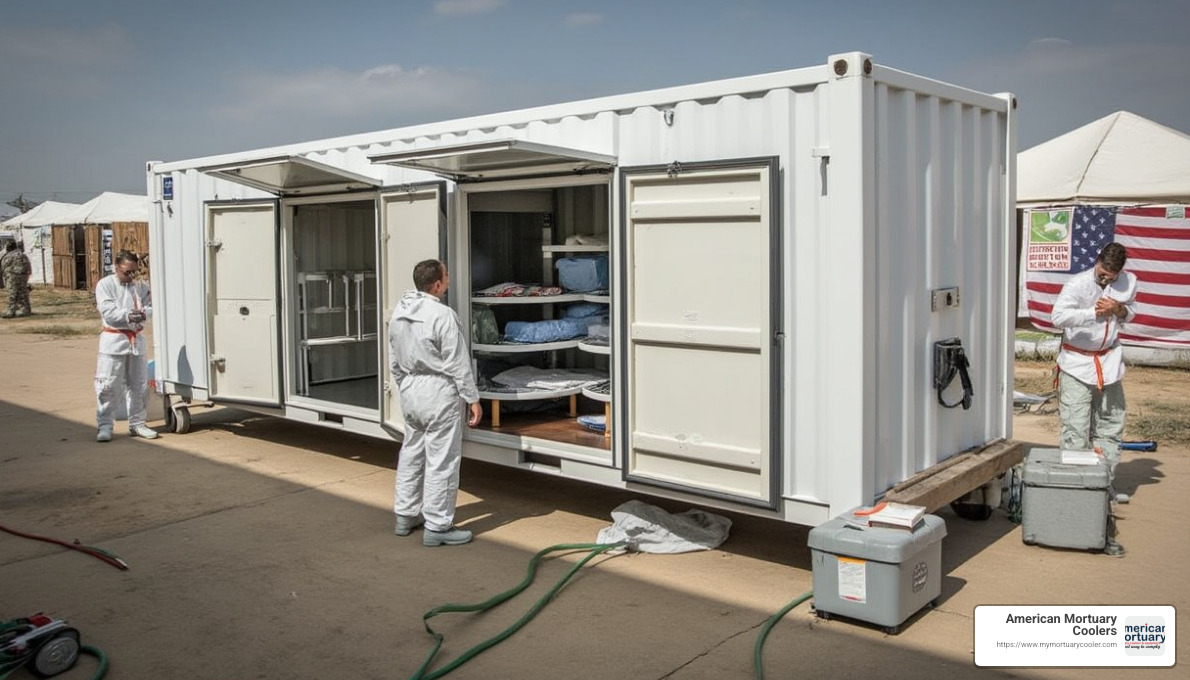
Most modern units are designed for quick setup, with many models ready for operation in under 30 minutes. This rapid deployment capability is crucial when time is of the essence. The units typically accommodate standard mortuary trolleys, making body transfers dignified and efficient even in challenging circumstances.
"We had our AirCool system unpacked and cooling within 20 minutes of delivery," shared a hospital administrator from Memphis who worked with us during a recent facility renovation. "The casters made positioning simple, and the compatibility with our existing trolleys meant we didn't miss a beat in our operations."
Safety isn't just about proper handling—it's also about maintaining compliance with regulatory standards. Quality mobile mortuary freezers meet CE and FDA requirements, ensuring they're appropriate for medical use even in temporary settings.
Operating a mobile mortuary freezer during disasters
When disaster strikes, mobile mortuary freezers become critical infrastructure in the most challenging environments. At field hospitals, these units provide essential dignity in the midst of chaos. Military deployments often use ruggedized models specifically designed to withstand rough handling and extreme conditions.
"The unit we received from American Mortuary Coolers during last year's tornado response was a godsend," recalled an emergency management director from our Kentucky service area. "Despite the surrounding devastation, we maintained proper preservation conditions, giving families time to make arrangements during an incredibly difficult period."
Airports and transportation hubs represent another crucial deployment scenario. During international incidents or repatriation efforts, mobile mortuary freezers positioned at these locations facilitate efficient processing while maintaining proper preservation standards.
When existing morgue facilities reach capacity—as many did during the COVID-19 pandemic—these mobile units provide seamless overflow capabilities. The key is establishing clear documentation systems that track remains across both permanent and temporary storage locations, ensuring nothing falls through the cracks during challenging times.
Power redundancy becomes especially important during disasters. Our experience serving clients across hurricane-prone regions has taught us the importance of generator rotation schedules and fuel management protocols to ensure continuous operation when the grid is unreliable.
More info about Mobile Chill guide
Maintenance & servicing checklist
Even the best mobile mortuary freezer requires regular maintenance to perform reliably. A thoughtful maintenance program ensures your unit will be ready when needed most.
Daily temperature checks are the foundation of good maintenance practices. These simple verifications, along with quick inspections of door seals and condensation management, can prevent most common issues before they develop into problems.
Weekly attention to condenser coils keeps your system running efficiently. A quick cleaning removes dust and debris that can reduce cooling performance and increase energy consumption. While you're at it, checking drain lines and lubricating hinges takes just minutes but prevents frustrating problems down the road.
"The maintenance schedule American Mortuary Coolers provided with our unit has been invaluable," shared a funeral director from Knoxville. "The simple weekly tasks have kept our system running flawlessly for three years now."
Monthly sanitization is essential for maintaining proper hygiene standards. This deeper cleaning, combined with electrical connection inspections and alarm testing, ensures both operational reliability and compliance with health regulations.
Quarterly professional inspections catch potential issues before they become emergencies. During these visits, our technicians evaluate refrigerant levels, compressor performance, and control system calibration. Many of our clients find that scheduling these visits in advance—perhaps during traditionally slower periods—minimizes operational disruption.
Annual comprehensive servicing by qualified technicians completes the maintenance cycle. This thorough evaluation includes refrigerant recovery and recharge if needed, compressor oil analysis, and complete system performance certification.
At American Mortuary Coolers, we've found that clients who follow these maintenance guidelines experience significantly fewer unexpected issues and longer equipment lifespans. As one medical examiner from our Virginia service area put it: "The quarterly maintenance program has virtually eliminated unexpected downtime. The peace of mind alone is worth the investment."
Cost, Procurement & Customization Strategies
Investing in mobile mortuary freezers requires careful financial planning and consideration of both immediate and long-term needs. Understanding the cost factors, procurement options, and customization possibilities helps organizations make informed decisions that balance budget constraints with operational requirements.
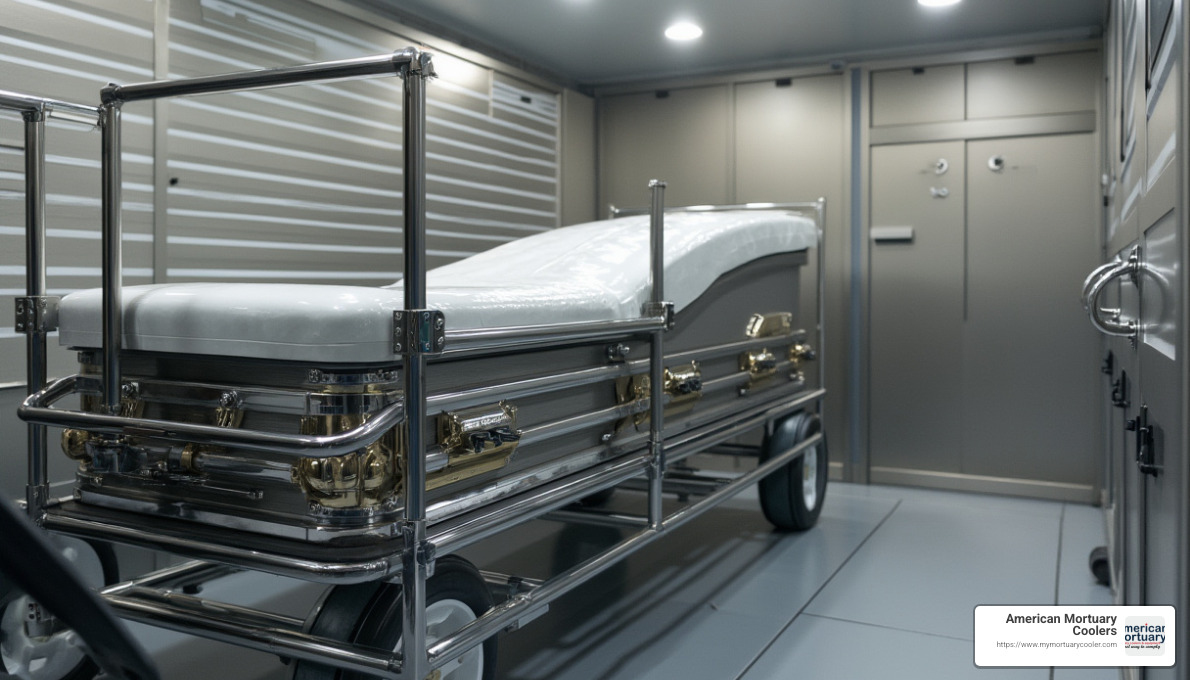
Buying or renting a mobile mortuary freezer: what to consider
When it comes to acquiring a mobile mortuary freezer, you essentially have two paths: buying or renting. Both have their place depending on your specific situation.
If you're considering purchasing, be prepared for an initial investment ranging from $5,000 for basic single-body models to upwards of $60,000 for advanced multi-body systems. While this might seem steep at first glance, ownership can be more economical in the long run if you have consistent needs. That said, you'll need to factor in maintenance responsibility (those compressors don't maintain themselves!), and you'll need somewhere to store the unit when it's not in use.
Many of our clients at American Mortuary Coolers appreciate the financing options we offer, which effectively convert a large capital expenditure into more manageable monthly operational expenses. As one hospital administrator in Dallas told us, "During COVID-19, we initially rented two mobile mortuary freezers, but as the pandemic continued, we analyzed costs and decided to purchase one unit while maintaining one rental. This hybrid approach gave us both permanent capacity and flexibility."
Renting, on the other hand, offers remarkable flexibility for temporary needs. Most rental agreements include regular maintenance and emergency repairs (no surprise bills!), and you won't need to worry about storage when the unit is no longer needed. Rental fleets are typically updated regularly, so you'll always have access to newer models with the latest features.
When deciding between buying and renting, consider the duration of your needs. For requirements under six months, rentals typically prove more economical. For longer-term needs, purchasing often provides better return on investment. Don't forget to factor in transportation costs, setup requirements, and potential relocation needs when comparing options.
More info about top morgue freezers
Custom features that add value
Today's mobile mortuary freezers can be customized with features that significantly improve functionality, efficiency, and dignity. These aren't just bells and whistles – they're practical improvements that make a real difference in various operational contexts.
The Mortech MERC System® uses direct contact liquid cooling technology, providing more efficient temperature control than traditional air-cooling methods. This is particularly valuable in field operations where ambient temperatures might swing wildly throughout the day.
For operations concerned about power reliability or environmental impact, solar power integration is becoming increasingly popular. These supplemental panels reduce operational costs and provide crucial backup during power outages – something that's given many of our clients peace of mind during storm season.
Digital tracking has revolutionized how facilities manage remains. RFID-enabled body tracking, digital inventory management, and cloud-based monitoring systems improve accountability and documentation. One medical examiner we work with mentioned that this technology "eliminated the paperwork headaches and human error that used to plague our tracking systems."
Mobile mortuary freezers with collapsible and modular racking require minimal hardware and can be reconfigured quickly based on changing needs. This flexibility extends to capacity as well – modular systems allow for expansion or contraction as demands fluctuate, optimizing both space and operational efficiency.
Dignity in death extends to all body types, which is why specialized bariatric accommodations are so important. Custom-designed racks and trays support dignified storage of larger individuals, with some units accommodating persons weighing up to 256 kg (40 stone).
For our military clients, we've developed specialized features including reinforced construction for rough handling, NATO stock numbering for supply chain integration, and configurations for storing fully-armored casualties.
At American Mortuary Coolers, we've seen how custom solutions make a difference across all our service regions. For a medical examiner's office in New York, we created a hybrid system combining fixed coolers with mobile mortuary freezers that could be deployed to satellite locations as needed. This approach provided both permanent infrastructure and emergency flexibility – exactly what they needed for their unique operational challenges.
Conclusion & FAQs
After diving deep into mobile mortuary freezers, it's clear these units aren't just equipment – they're essential tools that help professionals maintain dignity for the deceased during life's most challenging moments. Whether you're managing a small funeral home or coordinating disaster response, these portable cooling systems provide the flexibility and reliability needed when traditional options simply won't work.
From what we've seen at American Mortuary Coolers, the right mobile mortuary freezer can make all the difference during critical situations. Our Tennessee-based team has helped clients across the country – from busy hospitals in New York to remote disaster sites in the Southwest – find solutions that perfectly balance practical needs with respectful care.
The technology has come a long way, with options ranging from lightweight single-body units to comprehensive systems capable of serving entire communities during emergencies. Digital monitoring, energy-efficient cooling, and thoughtful design features ensure these units perform reliably when needed most.
Choosing the right mobile mortuary freezer isn't just about capacity or price – it's about finding a solution that aligns with your specific needs while honoring your commitment to treating the deceased with respect. Whether you're preparing for potential emergencies or addressing immediate needs, we're always here to help guide you toward the perfect solution.
If you have questions beyond what we've covered here, please don't hesitate to reach out. Our team understands these aren't easy conversations, but they're necessary ones – and we're committed to making the process as straightforward and supportive as possible.
More info about our leading solutions
FAQ #1: How cold should a mobile mortuary freezer be?
The ideal temperature for a mobile mortuary freezer falls between 0°C and 5°C (32°F to 41°F). Most of our units at American Mortuary Coolers are calibrated to maintain a steady 3°C (38°F), which research has shown to be the sweet spot for preservation without causing freezing damage to tissues.
For situations requiring longer-term storage (beyond several weeks), specialized freezer units can operate at lower temperatures around −18°C to −30°C (0°F to −22°F). However, we typically don't recommend these colder temperatures for routine use since they can complicate later procedures like autopsies and embalming.
The good news is that today's digital temperature controllers make it easy to maintain precise settings. Stability is just as important as the temperature itself – fluctuations can accelerate decomposition, so a reliable unit with proper insulation makes all the difference.
FAQ #2: How do you power a mobile mortuary freezer in the field?
Keeping a mobile mortuary freezer running in the field requires some planning, but there are several reliable options:
When standard power is available, simply plugging into existing electrical infrastructure works perfectly – most units run on either 115V (North American) or 220-230V (international) power. It's when you're in remote locations or during power outages that creativity comes into play.
Portable generators are the most common solution for field operations. Even our larger units can typically run on generators as small as 2 kVA (2000VA), though you'll want to ensure you have adequate fuel, proper ventilation, and a rotation schedule for extended operations. We've worked with disaster response teams who successfully maintained continuous cooling for weeks using properly managed generator setups.
For longer deployments, especially in sunny regions, solar-hybrid systems can supplement traditional power and reduce generator fuel consumption. We've helped clients in our Southwest Region implement these systems with great success.
Many of our trailer-based units feature flexible "shore power" connections similar to RVs, allowing them to adapt to various power sources as needed. And while batteries alone won't keep the cooling system running long-term, they can maintain critical monitoring and alarm functions during power transitions.
FAQ #3: How many bodies can a mobile mortuary freezer hold?
The capacity of mobile mortuary freezers varies widely depending on what you need:
Single-body units are our most compact option, perfect for small facilities or transport situations. These lightweight units are easy to move and set up quickly.
Our standard portable models typically hold between 2-6 individuals, with 2-body and 4-body configurations being the most popular. These units strike a nice balance between capacity and mobility – large enough to be useful but small enough to transport in a standard van.
For larger needs, modular systems like the Flexmort AirCool offer capacities in multiples of 4, ranging from 4 to 24 individuals in a single setup. These can even be linked together for additional capacity during major emergencies.
Trailer-based systems provide a self-contained solution for 6-12 individuals, depending on the configuration, and can be towed to wherever they're needed.
When planning your capacity needs, don't forget to consider bariatric accommodations. Standard units may not be suitable for larger individuals, and specialized bariatric units (which typically hold 1-2 people) might be necessary depending on your community's demographics.
We've helped clients from small rural funeral homes to major urban hospitals determine the right capacity based on their specific situations. From our experience across the country – from our Midwest operations to our Pacific Region locations – we can help you develop a realistic plan that meets both everyday needs and potential surge requirements.
















